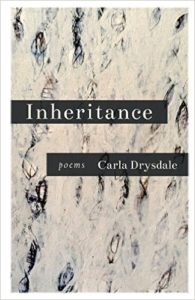 Carla Drysdale. Inheritance. Finishing Line Press, 2016. 29 pgs. $14.49.
Carla Drysdale. Inheritance. Finishing Line Press, 2016. 29 pgs. $14.49.
Reviewed by Lynn Domina
We might be entering a new age of the chapbook, just as we’re entering (I think) a new age of the prose poem. Dozens of presses are now publishing chapbooks, and writers who’ve published multiple full-length collections are embracing the form, often for projects well-suited to this publishing mode, sequences of related poems, for example, that gain substance from being published together without the context of additional unrelated poems. Although poets still often begin their careers with chapbooks, the form, in currently appealing to established poets also, is redefining itself and elevating its prestige. Finishing Line Press is no longer an upstart as small presses go—it’ll celebrate its twentieth anniversary in two years—and it specializes in the chapbook, publishing multiple titles each year. It has become, in fact, one of the most influential chapbook publishers in the country. Carla Drysdale’s Inheritance is her first chapbook, but it follows a full-length collection, Little Venus, which was published in 2009. The poems included in Inheritance are thematically linked, as the speaker considers the lives of her children and her parents. The content is often difficult, but Drysdale is able to articulate strong emotion by recollecting it, if not exactly in tranquility, then with measured concern.
The opening poem, for instance, which is also the title poem, explores her two sons’ differences which align them with her in distinctive ways. The poem intensifies as its proceeds, until what’s most surprising is also what’s most unsettling. The opening lines are straightforward, and the tone seems calm, nearly objective, but it is also deceptive:
One of my two sons devours books
as I did, bespectacled, silent.
There are childhood facts I’d like to check,
but the past is unpopular
with my mother. Her husband wasn’t a reader.
His eye was on me during the day
and at night,…
The transition from assurance to ominous occurs already in the second couplet, which—through Drysdale’s line break—initially seems to refer to the son. Readers are startled, then, at the introduction of the mother, and slightly uneasy therefore with the husband who “wasn’t a reader.” Drysdale exploits her options with the line again between couplets two and three: “during the day // and at night,…” The poem narrates the speaker’s experiences with her mother and stepfather and then turns again, at the 2/3 mark, to discuss the “other son.” He
peers into
the legacy behind my eyes,
at what I’m trying to hide.
His pleasure and pain
are always mine
as when he kisses his cat or bends
his pen in half and yells at me,
enraged by the words
on the page.
This son initially seems empathic and affectionate, and again meaning bends across the turn of the line break. He “bends,” not for a hug or caress, but to break the pen that won’t properly write the words he can’t properly read. Superficially, this son is the opposite of the first who “devours books,” but this son is devoured by inarticulate rage, just as the speaker is as she recalls the actions of her stepfather and the inaction of her mother. The sons, by responding to print as differently as they do, create a composite of their mother’s apparent and hidden character. Drysdale, in choosing the restraint of couplets and the flexibility of the enjambed line, permits the poem to reveal rather than to declare its meaning.
Many of the poems in Inheritance work similarly, including the final poem, “Rafael’s Question,” which is also composed in couplets and also concerns the speaker’s position generationally between her sons and her parents. This poem imagistically and thematically links the chapbook’s end to its beginning, but now there’s an implication of reconciliation with the events life has brought rather than rage at them. The son’s final question regarding his grandparents is poignant—“He asks, ‘Do you still love them?’ / So gently, so gently”—because it’s ultimately a question about whether the speaker’s ability or inability to love as a daughter will be replicated in her ability or inability to love as a mother.
Formally, the most unusual poem in the collection is “Labyrinth,” which relies on anaphora to establish a chant-like rhythm through the first half. These stanzas describe the speaker’s mother’s protection:
She who bore me, supported my slack newborn neck
in her palm while she bathed me in a small basin,
warm water tested on her wrist
At exactly the half-way point, though, the tone and content shift:
Who covered me up in the sun, but neglected the darkness
I was in…
There is no more “She who” protects the speaker, but lines like this: “Abandonment, it sounds so harsh, then and now, / well, doesn’t it?” If it sounds harsh, it is because maternal abandonment is harsh. The final stanza describes the speaker’s relationship with her mother as a “labyrinth of denial”—complicated denial, for its unclear whether it’s established by the mother or by the speaker, and so is attached to both. A labyrinth, though, is different from a maze in that the path of a labyrinth never leads to a dead end. The path of a labyrinth always leads to the center and then to the exit as long as the pilgrim keeps walking. So although the poem ends with the word “dead,” some hope remains, at least implicitly.
Although short, Inheritance is not slight. The poems are thoughtfully composed, and they will stay with you.
